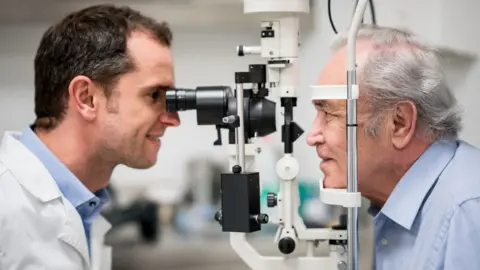Drivers should have mandatory eyesight test, says top optician
 Wales news service
Wales news serviceMotorists should have to pass mandatory sight tests to stop people with dangerously poor eyesight driving, a top optician has said.
It comes after a father was killed by a driver who defied an optician's warning to stay off the road in 2015.
Chief of Optometry Wales Sali Davies, said opticians are being put in an "uncomfortable" position as it is up to patients to self-refer to the DVLA.
The optical health regulator said it was considering new guidance.
The UK's legal driving standard is to read a car number plate - with glasses or contact lenses, if necessary - from 20 metres.
In most cases, doctors and opticians advise the driver not to get behind the wheel, but it is the duty of the driver to inform the DVLA their eyesight is no longer good enough to drive safely.
 Wales news service
Wales news serviceFormer soldier Nigel Sweeting was jailed for seven years in May last year after he killed motorcyclist David Evans, 49, in a hit-and-run crash on the M4 in Newport on Christmas Day 2015.
Newport Crown Court heard Sweeting, who had poor peripheral vision, was "fully aware" of his vision problems and had ignored his optician's advice not to drive.
"This placed the optician in a very uncomfortable position knowing that they had done what was currently required of them but that the patient's own inaction had then caused death," said Ms Davies.
She spoke to BBC Wales after three police forces in England announced plans to test every motorist they stop in a bid to clamp down on drivers with defective eyesight.
Welsh police forces said officers regularly conducted roadside eyesight tests on motorists and have the power to immediately ban people from driving.
But only North Wales Police has carried out a special operation specifically to test drivers' eyesight.
 Getty Images
Getty ImagesWhile she "tentatively" supports roadside vision tests, Ms Davis said such examinations would not pick up on some conditions.
"Very often people have problems with their peripheral vision so they might not see what's on their left side of them or the right side of them," she said.
"We do know many cases of local opticians, particularly in Wales, where they do really agonise, I think, over making that decision around telling a patient that they are unable to drive," she said.
Guidance by the College of Optometrists, the professional body for optometrists, said patient confidentiality "is not absolute and can be broken if it is in the public interest to do so".
However, the guidance advises optometrists to take a number of steps before informing the DVLA, and even then suggests they contact their professional or representative body for advice.
The duty is then on the patient to tell the DVLA they can no longer drive and take themselves off the road, and Ms Davies said confidentiality meant many opticians felt they could not raise concerns.
The General Optical Council (GOC), which regulates the optical profession, said practitioners have an "overarching duty to protect the public", which would include notifying the DVLA if they believe their patient was a risk to the public.
"We are currently considering if further guidance is required and what form it might take," a GOC spokesperson said.
